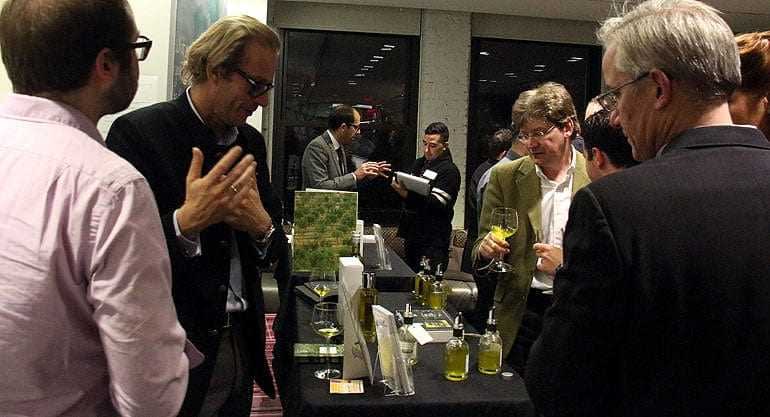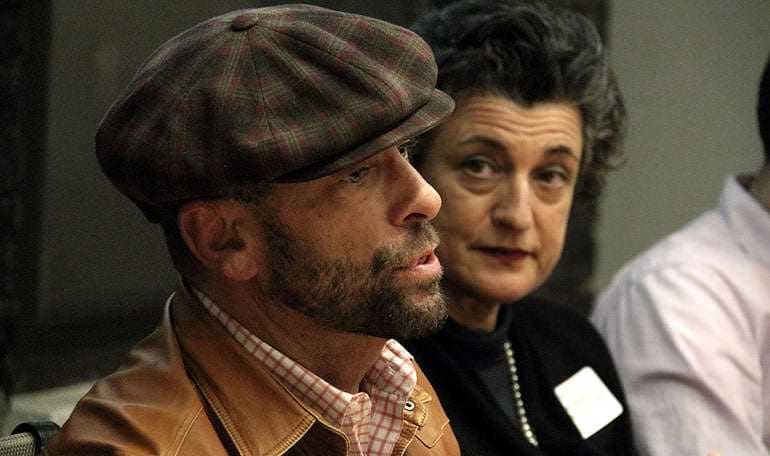
Remy Reboul presents Château d’Estoublon early harvest olive oils at an event in New York hosted by De Medici Imports
New York’s first “early harvest release,” hosted by De Medici Imports at the headquarters for the National Association for the Specialty Food Trade, welcomed olive oil producers, experts, chefs, and writers to taste new oils from the Mediterranean’s first harvest this season.
Food journalist and television personality David Rosengarten opened the event’s panel discussion by defining the “dense statement of early harvest release” and the tradition of using “underripe olives, producing a green, wonderfully fruity, peppery oil.”
The event featured extra virgin olive oils from four producers. During the opening seminar, each producer had the opportunity to speak about terroir, production methods and the qualities that make his or her oil unique. Rosengarten observed that the producers, primarily estate operations, were boldly “commercializing early releases” to give consumers a taste of the freshest oils available. All four producers had oil samples flown in for the event.
The fifty or so attendees first heard from Gerard Veá, of VEÁ Olive Oil, in Lérida, Spain. In conversation with Emilio Mignucci, an owner of Philadelphia area specialty food merchants, Di Bruno Bros., Veá explained the careful temperature control involved in preserving the flavor of early release oils. He also spoke to the role of weather in subtleties of flavor and oil quality with each new harvest. VEÁ’s early harvest extra virgin olive oil is 100 percent Arbequina, a celebrated Catalan variety.
Olive oil expert and educator Nicholas Coleman then spoke with Emanuela Stucchi Prinetti, from Badia a Coltibuono, a Tuscan producer of great history and tradition. Discussing the evolving role of technology in olive cultivation, Prinetti described the challenges and rewards of producing olive oil and wine on the same estate. Illustrating the role of altitude on cultivation, Pinetti shared the vision of her father, whose innovation would eventually lead to the completely organic production at Badia a Coltibuono. “The health and integrity of the olives is of the utmost importance,” she remarked. Only 8,000 bottles of Albereto Organic Extra Virgin Olive Oil, the estate’s early release, are available each year.

Vic Rallo, host of the television series “Eat! Drink! Italy!” with Emanuela Stucchi Prinetti from the Badia a Coltibuono estate
The seminar also saw Remy Reboul, producer of the Provençal Château d’Estoublon, in conversation with Curtis Cord, publisher of Olive Oil Times and founder of the New York International Olive Oil Competition. Cord recalled tasting Chateau d’Estoublon’s Grossane monovarietal in a small shop in St. Tropez 20 years ago that was his first experience with a “great olive oil.” Though the estate’s production technology has evolved since then, the careful cultivation has not. The estate has only 6,700 trees, and their olives are harvested by hand for optimal ripeness. Though he produces five monovarietal oils, Reboul’s early harvest, AOP Vallée des Baux de Provence is a blend that includes all five French olives.
Xandra Falco, in conversation with Jeffrey Shaw of the Trade Commission of Spain in New York, spoke about Marques de Griñon in Toledo — another producer with hundreds of years of history. Whereas the estate’s olives were once “crushed” at the mill, modern technology more delicately “slices” the olives, Falco explained. Falco’s production line is able to create and bottle olive oil in just 30 minutes, optimizing freshness, flavor and healthfulness. Her early harvest oil, Oleum Artis Extra Virgin, combines Arbequina and Picual varietals.
The tasting, which followed the speakers, allowed producers to share the robust flavors of their early harvests with seminar attendees. A celebration of small, high-quality olive oil makers, the event aimed to give much-needed positive press to olive oil imports. Steve Kaufman, Executive vice president of De Medici, and one of the organizers of the event, stated that the event was an opportunity to “demonstrate that better olive oils come from early harvesting and show off great oils.”
All four producers explained that embracing technology was critical to the preservation of their historic estates. As Reboul stated, “we have to stick to strict rules to produce the highest quality olive oil.” This display of European commitment to small production and quality was welcomed by American palates. As Rosengarten noted, with an increase in American consumer knowledge of olive oil, any opportunity to grow “American trust in extra virgin olive oil” is a great one.








